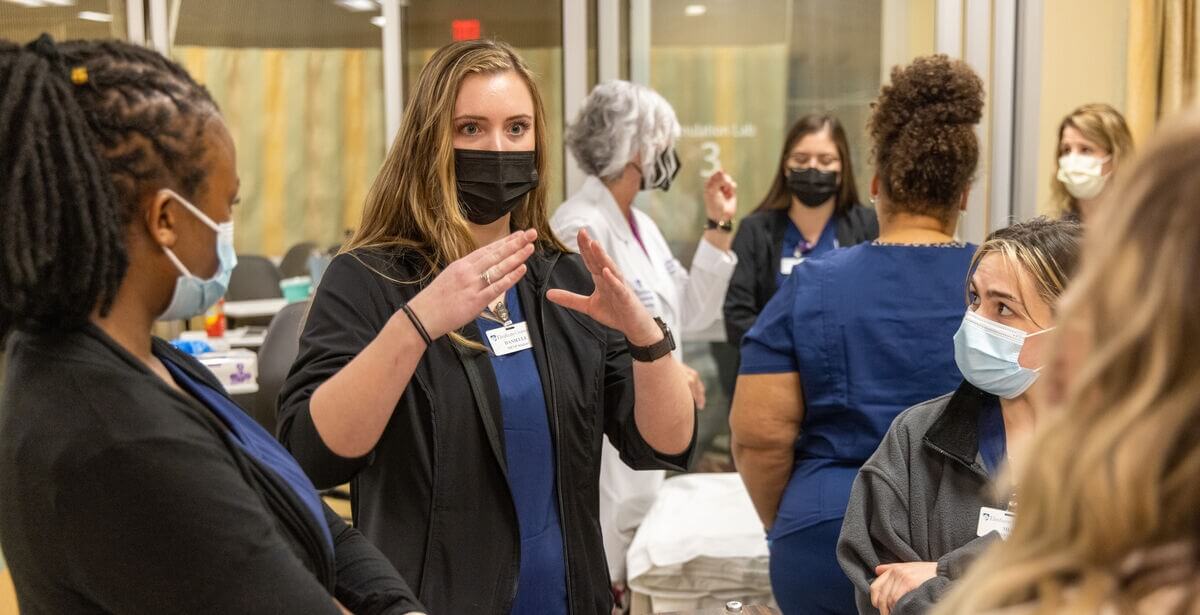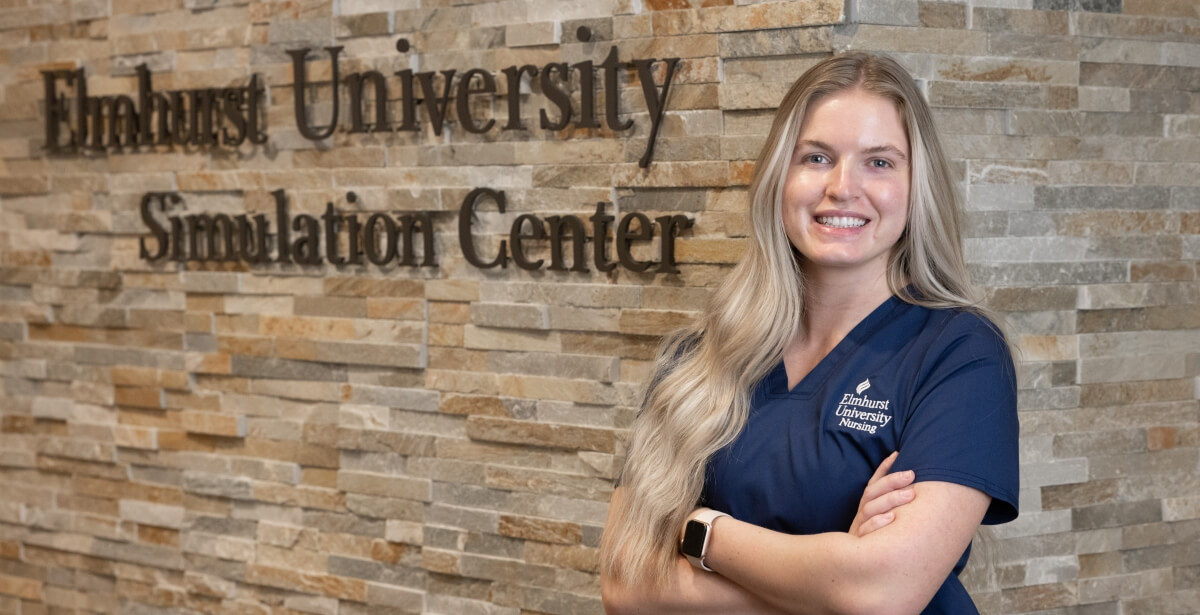Becoming a Nurse Practitioner: 5 Benefits of Choosing a Direct Entry MSN Program

Ask around, and you’ll hear countless nursing professionals say they find their jobs rewarding. Many are committed to furthering their education throughout the span of their careers. Perhaps Florence Nightingale summed it up best when she said, “Let us never consider ourselves finished, nurses. We must be learning all of our lives.”
Whether you’re ready to pursue nursing as a second career or looking to advance in health care, becoming a Nurse Practitioner (NP) can open a wide variety of doors in the medical field.
Nurse practitioners are health care providers who treat patients directly in a wide variety of settings. They begin their career path as registered nurses, and they undergo advanced training and clinical education in order to practice direct patient care at an advanced level. NPs can examine, diagnose, and treat patients in many health care settings, including hospitals, urgent care clinics, primary care practices and specialized fields.
Explore Elmhurst's Online Direct Entry MSN
Master’s in Nursing Benefits
There are many benefits of being a nurse practitioner, and if you already have a bachelor’s degree in another field, direct-entry nursing programs make the transition to nursing simple. Those who are looking to enter the profession of nursing—especially those who want to pursue a leadership role in the field or go on to become an advanced practice nurse (APRN)—can elect to enter a direct-entry Master of Science in Nursing (MSN) program for non-nurses to become a registered nurse in an accelerated time frame.
A direct-entry MSN program is an intensive full-time program that provides an academic foundation in nursing, practical training through clinical rotations and leadership skills through leadership-specific coursework. After completing Elmhurst University’s 20 month program, you will be qualified for the Clinical Nurse Leadership certification and the NCLEX-RN examination. After passing the NCLEX-RN, you can earn a post-graduate certificate that allows you to begin practicing as an NP.
A direct-entry MSN is designed for students who have already earned a bachelor’s degree in a non-nursing field, offering them the fastest pathway to becoming a Nurse Practitioner.

Your first year of study will concentrate on foundational nursing coursework, introducing you to nursing interventions, prioritization of patient needs and direct patient care clinical rotations.
In your final semesters, you will focus on nursing leadership, with courses that address health care systems, population health and technology in health care.
You may be asking, “What is the value of a master's degree in nursing?” For many, MSN is the first step toward a promising career in nursing. Nursing job openings are on the rise, with nearly 200,000 new jobs becoming available each year through 2031. This is an excellent time to step into a direct-entry MSN program and begin a second career, and there are many benefits you can look forward to as you transform your career path. If you hope to become an NP, earning an MSN degree is a great first step.
Employers like to hire second-degree RNs
Having a proven track record in both academics and a non-nursing career field actually makes you a more attractive candidate for admission to an MSN program and, ultimately, for professionals looking to hire RNs. The AACN reports that second-degree students are often more mature and more focused on their academic success. Similarly, employers appreciate second-career RNs who “possess strong clinical skills and are quick studies on the job.”
Expanding job opportunities are expected in all nursing roles
According to the American College of Schools of Nursing, the RN shortage is growing. As a large segment of the current RN population reaches retirement age, there will be an expanding pool of open nursing positions. Additionally, 4-year nursing program enrollment is not expected to keep up with expected needs. Direct-entry nursing programs can help to ensure that those expected needs are met. And as the average life expectancy continues to lengthen, more nurses will be required to care for the aging population. Earning your MSN is a valuable first step toward a secure career.
MSN degree holders have many career options
Earning a master’s in nursing is a foundational step toward many career paths in nursing. An MSN helps you succeed in many subsequent degree programs and certifications to become an RN or NP. An MSN can be a beneficial differentiator in a competitive job market for the following roles:
- Advanced Practice Registered Nurses (APRN) take on many roles, including Nurse Practitioners (NP) and Clinical Nurse Specialists (CNS) who deliver care within a specific population or type of care (such as rehabilitation or mental health). An MSN degree, in combination with post-master certificate programs, can prepare these individuals for national certification exams and eventually APRN licensure.
- Nurse Administrators facilitate and deliver care at the bedside and manage teams of nurses to deliver high-quality care.
- Nursing Consultants provide medical and legal analysis for organizations, such as hospitals, insurance firms or pharmaceutical companies.
- Public Health Nurses work to manage disease prevention and control with community leaders and policy experts; they may manage clinics.
- Research Nurses work in a laboratory or other research settings managing and analyzing patient data to advance patient care.
What Can You Do with a Master's in Nursing?
MSN holders receive valuable leadership training
For students who are interested in a leadership role that focuses on quality and safety stewardship, the MSN allows you to gain RN experience and move into a leadership role faster than a BSN-prepared RN. As you complete your MSN coursework, you will learn valuable leadership skills that will help you excel in your chosen career path for years to come.
Some MSN programs set students up for success in earning the Clinical Nurse Leader (CNL) designation, a credential given only after a national certification exam. The primary responsibilities of the CNL are:
- Care coordination
- Outcomes measurement
- Transitions of care
- Interprofessional communication & team leadership
- Risk assessment
- Implementation of best practices based on evidence
- Quality improvement
A student who is evaluating master’s-level programs should look for one that readies its students for AACN’s CNL certification exam. Success on the exam confirms a nurse’s knowledge and skills in leadership, clinical competence, risk reduction and evidence-based practice while increasing their desirability as a job candidate.
You'll have a faster pathway to future graduate programs
Once you have earned a master’s in nursing, many additional opportunities may present themselves. With a wide range of nursing specializations at your fingertips, you will be able to choose a career path that feels inspiring and rewarding, pursuing additional certifications or degree programs to reach your goals. With an MSN degree in hand, you will be positioned to continue your education as a:
- Nurse Practitioner (NP)
- Certified Nurse Midwife (CNM)
- Clinical Nurse Specialist (CNS)
Beyond these specialties, there are post-graduate programs for those seeking the highest levels of credentials in nursing practice. The Doctor of Nursing Practice (DNP) degree focuses on clinical care and delivery and on quality improvement through translational research. DNPs often fill advanced leadership roles in nurse management, organizational leadership or state and national health policy.
Ph.D. in Nursing programs are often selected by those who want to engage in research to generate new knowledge or education, while also allowing them to continue clinical work if they choose.
Pros and Cons of Becoming a Nurse Practitioner
After you’ve completed your direct-entry MSN program, you may be considering taking steps to become a nurse practitioner. This is a highly desirable career in health care, with many valuable benefits and a wide variety of job opportunities. There are several specific nurse practitioner benefits that not every health care career shares. Here are a few things you can expect as an NP that may help you determine if this is the right second career for you.
Nurse practitioners often have flexible work hours
While some NP jobs may include night shifts, weekends or holidays, many nurse practitioners have the ability to choose their own schedule, selecting a specialization that works best for their lives. Some nurse practitioners choose to work in a clinic setting, working 12-hour shifts to enjoy a shorter work week with a better work-life balance. Others may work in an emergency setting, working 8 or 10-hour shifts. Whether you prefer to work early mornings, evenings or overnights, there is a job for you as a nurse practitioner.
Nurse practitioners receive competitive pay
According to the Bureau of Labor Statistics, nurse practitioners were paid an average salary of $120,680 in 2021. In addition to a competitive salary, many employers also provide excellent health and retirement benefits. Your salary may vary depending on your location and specialty, but you can expect to earn a competitive wage as a nurse practitioner no matter where you practice.
Nurse practitioners can enter many specialized fields
Nurse practitioners often have the ability to work with their preferred population, from pediatrics to geriatrics. There are also opportunities to pursue specific specialties, including women’s health, mental health, acute care or primary care. As a nurse practitioner, you are also not limited to jobs in clinical settings. If you want to pursue a career in clinical research, become a professor, or work in public health, an NP program can help you get there.
Nurse practitioners often have the ability to work independently
As a nurse practitioner in the United States, you will be able to practice in one of three environments based on your state of residence. Many states allow NPs to enjoy a full practice environment, as is recommended by the National Academy of Medicine. In these states, nurse practitioners can diagnose and treat patients, prescribe medicine and manage patient care independently.
Nurse practitioners can enjoy a career with job security
Many career fields are experiencing instability, but the medical field will always require the expertise and care of experienced practitioners. The job outlook for nurse practitioners is especially promising — the Bureau of Labor Statistics projects this field to grow by 40 percent from 2021 to 2031, which is much faster than the national average.
Nurse practitioners deal with high-pressure situations and illness exposure
As is the case in most medical careers, nurse practitioners face challenging days at work. From high-pressure situations that arise in acute care settings to navigating “medical mysteries,” treating patients can be difficult. Additionally, treating sick patients can expose providers to those illnesses on occasion. However, many nurse practitioners find that the challenging days inspire and motivate them to continue their work.

Find the Right Direct-Entry Master’s in Nursing Program
An accredited online Master’s Entry in Nursing Practice (MENP) program welcomes students who began their education in pursuit of a different career path, but now are committed to their goal of entering the profession of nursing. All nursing programs are not created equal, so it’s important to choose the right school for you.
If you’re looking for an immersive educational experience in nursing with online coursework, you may want to consider the CCNE-accredited online MENP program at Elmhurst University.
Our academically strong, ethically driven online MENP is a rigorous, full-time program requiring a commitment of roughly 10 to 12 hours per day. Coursework, clinical rotations and a skills-focused residency will prepare nursing students with a thorough grounding in clinical care, plus incisive training in nurse leadership, all with the goal of improved patient outcomes.
Students will become fully immersed in the following program themes:
- Clinical Nurse Leadership: Gain skills and knowledge that will allow you to evaluate concepts, theories and principles from a systems perspective. This prepares you for the NCLEX-RN exam and Clinical Nurse Leader certification to validate your comprehensive skills and knowledge.
- Evidence-Based Nursing Practice: Build a scientific foundation for practice in an advanced nursing role to understand, identify and manage the disease process across the lifespan, using a systematic, patient-centered approach in all aspects of care.
- Quality Improvement and Research Methods: Analyze policies, finances and systems within organizations to support professional nurses and patient populations, locally and regionally. Build competencies in research, health care systems and information technology to foster change and improve outcomes.
- Advocacy, Ethics and Accountability: Incorporate ethical principles and adhere to professional values in the execution of nursing practice with diverse populations and community systems in order to provide the utmost standard of care and be a voice for patients and the nursing profession.
The faculty and administration at Elmhurst University are dedicated to student success and have structured the MENP program to help students achieve their goals. Although courses are offered online, there are opportunities to interact with instructors and fellow students online throughout the program, as well as in person during the residency.
Our online MENP program includes NCLEX-RN preparation, as well as support and assistance for securing clinical rotations.
If you are ready to begin an incredibly rewarding second career, learn more about the many benefits Elmhurst University’s nursing programs can offer. To get started at Elmhurst, read more about our MENP Program and schedule a call with one of our enrollment advisors.

